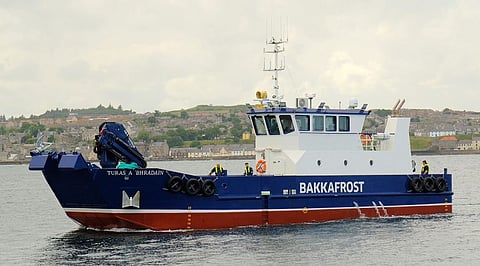

As with all Macduff Ship Design vessels, this compact but ultra-versatile aquaculture work boat is impressively innovative and beautifully detailed.
Practical, simple, economical and rugged, it will serve very well in the remote, cold Scottish lochs where the nation's economically important salmon farming takes place.
"It was developed from existing proven vessels but with the specific owner requirements of carriage of 125 tonnes of deck cargo whilst having no crane restrictions," Ian Ellis, Managing Director of Macduff Ship Design, told Baird Maritime. "It has multiple operational modes and can be required to perform a multitude of different tasks within a salmon farm. Given this, it is imperative that the vessel has the ability to conduct these operations and to be able to switch between them seamlessly."
For the designer, the main issue lay in ensuring that there was no crane restriction applied to the vessel for operations. Due to the operation of aquaculture vessels, the crane requirements are often demanding but there is an acceptance that in certain areas, there will need to be some level on operational restrictions for vessel safety. With Turas a 'Bhradain the crane size was maintained, but for simplicity, the owners insisted that the vessel had no restriction on crane operation.
"This meant considerable additional analysis at an early stage to satisfy ourselves that this requirement could be met whilst still providing an operating platform meeting the owner's other requirements."
The year 2023 was an interesting one for Macduff Ship Design with the completion of a range of different projects and the start of some new collaborations.
"Many areas of the marine industry are showing uncertainty with newbuild projects, which would seem to be largely driven by a lack of clarity about how environmental regulation will impact on the marine sector and what technologies and fuels are likely to be those that become mainstream," added Ellis.
"With these uncertainties and the lack of current viable alternatives to diesel propulsion, particularly within the trawling sector, coupled with other pressures on the fishing sector, there is less appetite for newbuild projects at this time. Those that are progressing are being driven by efficiency gains in the hull and machinery design and automation and quality improvements in the catch handling and storage. There has also been an interest in extending current vessel life and capability with refit and vessel lengthening projects."
Ellis believes that, within the aquaculture sector, significant technological and operational advances and changes are being seen all the time. This changing environment within the sector is leading to older vessels becoming less viable, and the preference leaning towards larger, safer and more capable vessels.
"With operation cycles increasing green technology's potential to be adopted, this is also seeing greater interest," Ellis told Baird Maritime. "We are looking forward to delivery of our first fully battery-powered aquaculture vessel starting operations in Norway over the coming weeks. We are also seeing a move towards larger, more complex, and safer vessels with green technology as an important driver within this sector going forward."
